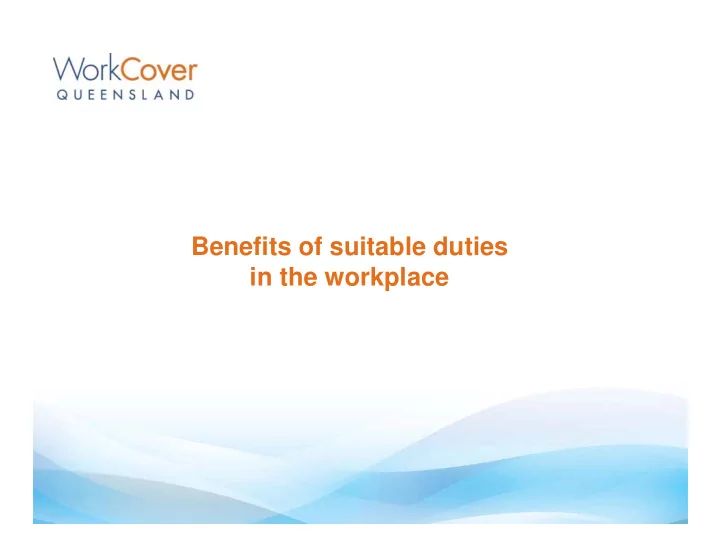

Benefits of suitable duties in the workplace
Industry challenges and strategies Agriculture • many crush injuries from quad bikes and beasts • musculoskeletal injuries from manual handling • employs many seasonal/itinerant workers • working together to promote practical solutions and to better understand visa conditions to aid RTW Construction • working from heights, fatigue, use of mobile and operational plant • lower literacy rates particularly in younger workers • focus on prevention of injuries with employers • free advisory assistance and employer forums available
Industry challenges and strategies Manufacturing • general downturn in the industry • injury prevention and a lack of suitable duties • tailored programs • working with WHSQ to establish metal industry networking groups Mining • camp claims which constitute one cycle of work • journey claims including DIDO or FIFO and restricted access to specialist or psychological services • Increasing awareness of these types of claims and encouraging suitable duties • working with practitioners to co-ordinating treatment and reduce travel and time costs
Industry challenges and strategies Tourism • unique physically demanding job roles • remote locations • small business • working with individual employers to develop resources to assist RTW Transport • falls from heights, safe handling of loads, traffic management on site and supply chain logistics • poor nutrition and diet • increasing awareness and promoting WHSQ network safety meetings
Total claim cost (statutory and common law) 2012–2013 $160,000,000.00 $140,000,000.00 $120,000,000.00 $100,000,000.00 $80,000,000.00 $60,000,000.00 Stat Claims $40,000,000.00 Common Law $20,000,000.00 $-
Avg. days to first RTW 2012–2013 Average days to first RTW 40 35 30 25 20 15 10 5 0
Health benefits of work Australasian Faculty of Occupational and Environmental Medicine (AFOEM)
How to identify suitable duties and develop appropriate programs Together with your worker, identify tasks they can perform within their capacity as ‘doing’ promotes recovery. Focus on what the worker can do, not what they can’t and provide suitable duties. Consider the following: • restrictions/limitations • days/hours to be worked • upgrading recommendations
A successful suitable duties program will: • match skills and physical abilities of the worker • promote reasonable levels of job satisfaction • have minimal impact on worker’s personal life • have minimal impact on worker’s earnings/career path • promote worker self-esteem and psychological well-being. Remember! • Suitable duties don’t always need to be in the pre-injury role • Think about other types of duties available in the workplace eg. kitchen duties, paperwork and other office projects put on hold due to shortage of staff
Suitable duties impact on premium and common law • Compensation payments for wages are included in calculation of premium • When you supply suitable duties and pay your employee for the hours worked, you reduce the costs associated with claims experience • return to work impacts past and future economic loss. Remember! • Maintain regular positive communication with your employee • Think prevention and aim for early return to work.
For more information: You can find industry specific information on our website workcoverqld.com.au • Agriculture • Construction • Education • Health and community care • Manufacturing • Medical and Allied Health • Mining and resources • Professional and administrative services • Retail and Wholesale • Tourism (Accommodation, Food, Arts and Rec services) • Transport
Recommend
More recommend